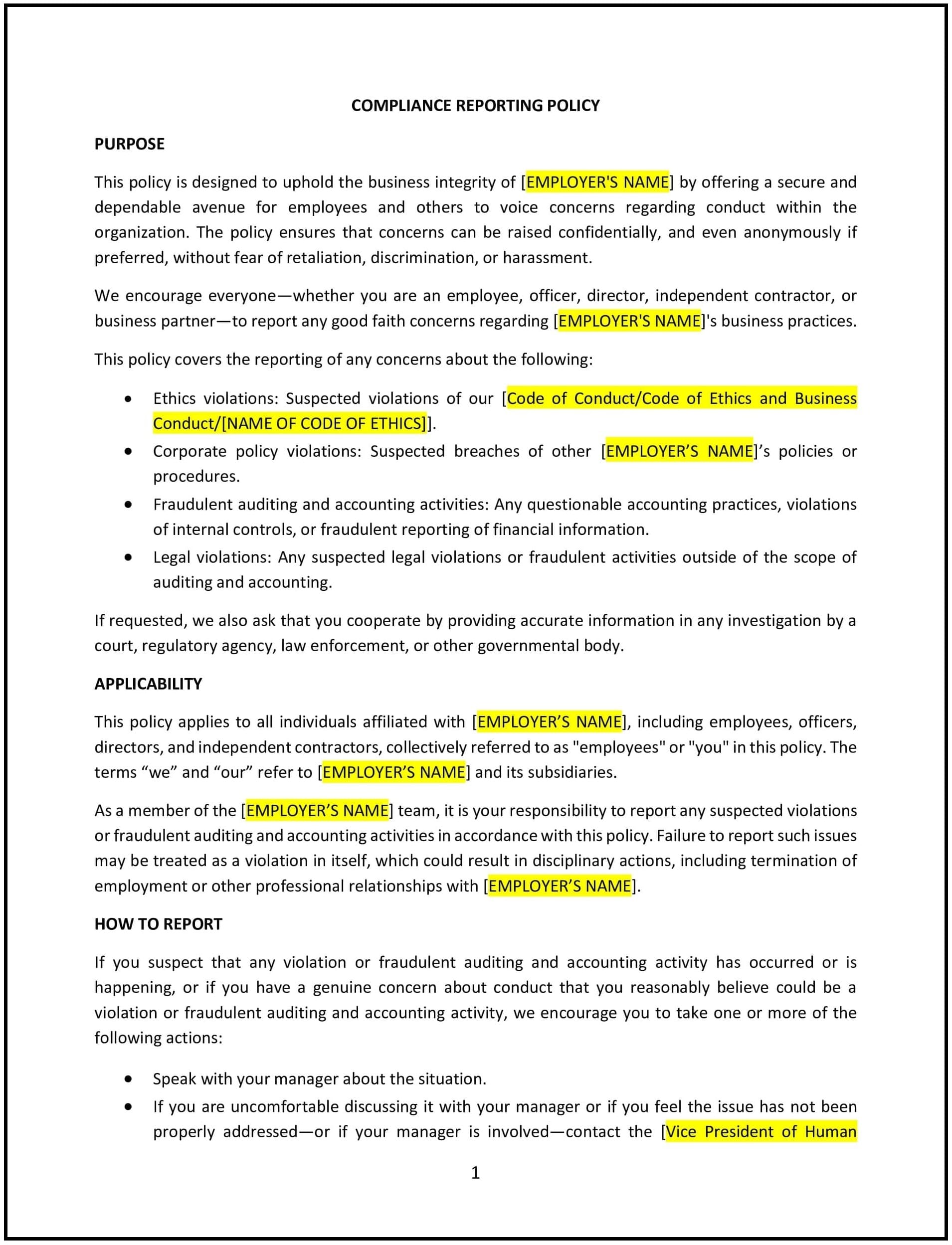Compliance reporting policy (Massachusetts): Free template
Got contracts to review? While you're here for policies, let Cobrief make contract review effortless—start your free review now.

Customize this template for free
This compliance reporting policy is designed to help Massachusetts businesses establish guidelines for reporting violations of company policies, laws, or regulations. The policy outlines the procedures for employees to report concerns, the protection available for whistleblowers, and the company’s commitment to investigating and addressing compliance issues promptly and thoroughly.
By adopting this policy, businesses can promote a culture of transparency, ensure compliance with applicable laws, and reduce the risk of legal and financial penalties by addressing potential violations early.
How to use this compliance reporting policy (Massachusetts)
- Define what constitutes a violation: Clearly specify what types of violations should be reported under this policy, such as breaches of company policies, legal violations, safety hazards, ethical misconduct, fraud, or financial irregularities.
- Establish reporting channels: Provide multiple, confidential, and accessible reporting channels for employees to report concerns, such as a dedicated hotline, email, or a reporting platform. The policy should outline how employees can report concerns anonymously if desired.
- Emphasize protection for whistleblowers: Ensure that employees who report violations are protected from retaliation, discrimination, or adverse actions. The policy should state that whistleblowers will not face retaliation for reporting in good faith, and outline steps the company will take to prevent retaliation.
- Specify the investigation process: Outline the process for investigating reported concerns, including who is responsible for handling reports, the steps involved in the investigation, and the expected timeline for resolution. The policy should make it clear that investigations will be conducted in an impartial, confidential, and thorough manner.
- Set confidentiality standards: Clarify that all reports and investigations will be kept confidential to the extent possible, while ensuring compliance with legal and regulatory reporting requirements. The policy should also specify who will have access to the reported information.
- Provide feedback to the reporting individual: Outline the steps the company will take to keep the individual who reported the issue informed, while maintaining confidentiality. This could include acknowledging receipt of the report and providing updates on the progress of the investigation.
- Define disciplinary actions for policy violations: Clearly specify the potential disciplinary actions for employees found to be in violation of company policies, laws, or regulations. These actions may include warnings, suspension, termination, or legal action, depending on the severity of the violation.
- Ensure compliance with Massachusetts and federal laws: Ensure that the policy complies with Massachusetts state laws and federal regulations, including those related to whistleblower protection, retaliation, and mandatory reporting of certain violations.
Benefits of using this compliance reporting policy (Massachusetts)
This policy offers several benefits for Massachusetts businesses:
- Promotes a culture of integrity: By encouraging employees to report violations, businesses can foster a workplace culture built on transparency, ethics, and accountability.
- Reduces legal and financial risks: By addressing compliance issues promptly and effectively, businesses can mitigate the risk of legal, financial, and reputational harm due to policy violations or legal breaches.
- Enhances trust with employees: Providing employees with clear, protected channels for reporting violations enhances trust in management and reinforces the company’s commitment to fair and ethical practices.
- Improves operational efficiency: Addressing compliance issues early allows businesses to resolve potential problems before they escalate, which can help maintain smooth operations and prevent costly disruptions.
- Protects the company’s reputation: A company that takes compliance seriously and acts promptly on reported violations is seen as responsible and trustworthy, which enhances its reputation among employees, clients, and the public.
- Ensures legal compliance: The policy helps businesses comply with Massachusetts state laws, federal regulations, and industry standards related to reporting and addressing violations, reducing the risk of regulatory fines and penalties.
Tips for using this compliance reporting policy (Massachusetts)
- Communicate the policy clearly: Ensure that all employees are aware of the compliance reporting policy, including how to report concerns, the protection available for whistleblowers, and the company’s commitment to investigating and resolving issues.
- Promote transparency and trust: Encourage employees to speak up and report concerns without fear of retaliation. Regularly remind employees of the importance of ethical behavior and the company’s dedication to addressing compliance issues.
- Offer training and awareness: Provide regular training to employees on the importance of compliance and how to recognize potential violations. This helps create an informed workforce that understands how to identify and report issues.
- Investigate concerns promptly: Act quickly and thoroughly when a report is made. A prompt response ensures that concerns are addressed before they can grow into larger issues and demonstrates that the company takes compliance seriously.
- Protect confidentiality: Maintain the confidentiality of reports and investigations to protect the identities of those involved and prevent any unnecessary exposure.
- Review and update regularly: Periodically review the policy to ensure it is compliant with Massachusetts state laws, federal regulations, and the company’s evolving business practices. Update the policy as needed to address any new legal requirements or industry best practices.